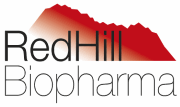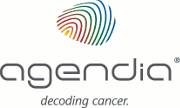- RedHill has initiated commercial activities in the U.S. with its gastrointestinal-focused sales force, promoting two gastrointestinal specialty products, Donnatal® and EnteraGam®
Tel-Aviv, Israel, Raleigh, NC, USA, June 13, 2017 / B3C newswire / -- RedHill Biopharma Ltd. (NASDAQ: RDHL) (Tel-Aviv Stock Exchange: RDHL) (“RedHill” or the “Company”), a specialty biopharmaceutical company primarily focused on the development and commercialization of late clinical-stage, proprietary, orally-administered, small molecule drugs for gastrointestinal and inflammatory diseases and cancer, today announced the initiation of the promotion of two gastrointestinal specialty products, Donnatal® (Phenobarbital, Hyoscyamine Sulfate, Atropine Sulfate, Scopolamine Hydrobromide)(1) and EnteraGam® (a serum-derived bovine immunoglobulin/protein isolate, SBI)(2) in the U.S.
RedHill’s U.S. commercial operations, headquartered in Raleigh, NC, include a gastrointestinal-focused sales force of more than 30 sales representatives promoting Donnatal® and EnteraGam® in select U.S. territories.
Guy Goldberg, RedHill’s Chief Business Officer, said: “We are excited to initiate promotion of Donnatal® and EnteraGam® in the U.S. This strategic step marks the transition of RedHill into a revenue-generating, gastrointestinal-focused, specialty pharmaceutical company in the U.S. RedHill has assembled an experienced sales force and an accomplished commercial home office team with a proven track-record in the GI field. We are eager to serve the needs of patients and target the greater market potential of Donnatal® and EnteraGam®. Our U.S. commercial operations are an integral part of RedHill’s strategic plan to commercialize our proprietary late-stage GI products, BEKINDA® (RHB-102)(3) for gastroenteritis and IBS-D, RHB-105 for H. pylori infection and RHB-104 for Crohn’s disease in the U.S., if approved by the FDA.”
Donnatal® is a prescription oral drug used with other drugs for the treatment of irritable bowel syndrome (irritable colon, spastic colon, mucous colitis) and acute enterocolitis (inflammation of the small bowel). RedHill has an exclusive co-promotion agreement with Concordia Pharmaceuticals Inc., a subsidiary of Concordia International Corp. (NASDAQ: CXRX) (TSX: CXR) (“Concordia”), granting RedHill certain U.S. promotion rights for Donnatal®. Under the terms of the agreement, RedHill and Concordia will share the revenues generated from the promotion of Donnatal® by RedHill, based on an agreed upon split.
EnteraGam® is a medical food intended for the dietary management of chronic diarrhea and loose stools which must be administered under medical supervision. RedHill has a license agreement with Entera Health Inc. (“Entera Health”), granting RedHill the exclusive U.S. rights to EnteraGam®. Under the terms of the agreement, RedHill will pay Entera Health royalties based on net sales generated from the sale of EnteraGam® by RedHill.
About Donnatal®
Donnatal® (Phenobarbital, Hyoscyamine Sulfate, Atropine Sulfate, Scopolamine Hydrobromide), a prescription drug, is classified as possibly effective as an adjunctive therapy in the treatment of irritable bowel syndrome (irritable colon, spastic colon, mucous colitis) and acute enterocolitis. Donnatal® slows the natural movements of the gut by relaxing the muscles in the stomach and intestines. Donnatal® comes in two formulations: immediate release Donnatal® Tablets and immediate release Donnatal® Elixir, a fast-acting liquid.
Important Safety Information about Donnatal®
Donnatal® is contraindicated in patients who have glaucoma, obstructive uropathy, obstructive disease of the gastrointestinal tract, paralytic ileus, unstable cardiovascular status, severe ulcerative colitis, myasthenia gravis, hiatal hernia with reflux esophagitis, or known hypersensitivity to any of the ingredients. Patients who are pregnant or breast-feeding or who have autonomic neuropathy, hepatic or renal disease, hyperthyroidism, coronary heart disease, congestive heart failure, cardiac arrhythmias, tachycardia or hypertension should notify their doctor before taking Donnatal®. Side effects may include: dryness of the mouth, urinary retention, blurred vision, dilation of pupils, rapid heartbeat, loss of sense of taste, headache, nervousness, drowsiness, weakness, dizziness, insomnia, nausea, vomiting and allergic reactions which may be severe.
Further information, including prescribing information, can be found on www.donnatal.com.
Please see the following website for complete important safety information about Donnatal®:
http://www.donnatal.com/professionals/important-safety-information/
To report suspected adverse reactions, contact Concordia Pharmaceuticals Inc. at
1-877-370-1142 or email: medicalinformation@concordiarx.com, or the FDA at
1-800-FDA-1088 (1-800-332-1088) or www.fda.gov/medwatch.
About EnteraGam®
EnteraGam® (a serum-derived bovine immunoglobulin/protein isolate, SBI) is a medical food product intended for the dietary management of chronic diarrhea and loose stools. EnteraGam® must be administered under medical supervision. EnteraGam® binds microbial components(4), such as toxic substances released by bacteria, that upset the intestinal environment. This helps prevent them from penetrating the lining of the intestine, which may contribute to chronic diarrhea and loose stools in people who have specific intestinal disorders(5).
Safety Information about EnteraGam®
EnteraGam® contains beef protein; therefore, patients who have an allergy to beef or any other component of EnteraGam® should not take this product. EnteraGam® has not been studied in pregnant women, in women during labor and delivery, or in nursing mothers. The choice to administer EnteraGam® during pregnancy, labor and delivery, or to nursing mothers is at the clinical discretion of the prescribing physician.
EnteraGam® does not contain any milk-derived ingredients such as lactose, casein or whey. EnteraGam® is gluten-free, dye-free and soy-free.
Please see full Product Information.
To report suspected adverse reactions, contact Entera Health, Inc. at 1-855-4ENTERA (1-855-436-8372), or the FDA at 1-800-FDA-1088 (1-800-332-1088) or www.fda.gov/medwatch.
About RedHill Biopharma Ltd.
RedHill Biopharma Ltd. (NASDAQ: RDHL) (Tel-Aviv Stock Exchange: RDHL) is a specialty biopharmaceutical company headquartered in Israel, primarily focused on the development and commercialization of late clinical-stage, proprietary, orally-administered, small molecule drugs for the treatment of gastrointestinal and inflammatory diseases and cancer. RedHill promotes two gastrointestinal products in the U.S. - Donnatal®, a prescription oral adjunctive drug used in the treatment of IBS and acute enterocolitis, and EnteraGam®, a medical food intended for the dietary management, under medical supervision, of chronic diarrhea and loose stools. RedHill’s clinical-stage pipeline includes: (i) RHB-105- an oral combination therapy for the treatment of Helicobacter pylori infection with successful results from a first Phase III study; (ii) RHB-104- an oral combination therapy for the treatment of Crohn's disease with an ongoing first Phase III study, a completed proof-of-concept Phase IIa study for multiple sclerosis and QIDP status for nontuberculous mycobacteria (NTM) infections; (iii) BEKINDA® (RHB-102)- a once-daily oral pill formulation of ondansetron with an ongoing Phase III study for acute gastroenteritis and gastritis and an ongoing Phase II study for IBS-D; (iv) RHB-106- an encapsulated bowel preparation licensed to Salix Pharmaceuticals, Ltd.; (v) YELIVA® (ABC294640)- a Phase II-stage, orally-administered, first-in-class SK2 selective inhibitor targeting multiple oncology, inflammatory and gastrointestinal indications; (vi) MESUPRON - a Phase II-stage first-in-class, orally-administered protease inhibitor, targeting pancreatic cancer and other solid tumors and (vii) RIZAPORT® (RHB-103) - an oral thin film formulation of rizatriptan for acute migraines, with a U.S. NDA currently under discussion with the FDA and marketing authorization received in two EU member states under the European Decentralized Procedure (DCP).
This press release contains “forward-looking statements” within the meaning of the Private Securities Litigation Reform Act of 1995. Such statements may be preceded by the words “intends,” “may,” “will,” “plans,” “expects,” “anticipates,” “projects,” “predicts,” “estimates,” “aims,” “believes,” “hopes,” “potential” or similar words. Forward-looking statements are based on certain assumptions and are subject to various known and unknown risks and uncertainties, many of which are beyond the Company’s control, and cannot be predicted or quantified and consequently, actual results may differ materially from those expressed or implied by such forward-looking statements. Such risks and uncertainties include, without limitation, risks and uncertainties associated with (i) the initiation, timing, progress and results of the Company’s research, manufacturing, preclinical studies, clinical trials, and other therapeutic candidate development efforts; (ii) the Company’s ability to advance its therapeutic candidates into clinical trials or to successfully complete its preclinical studies or clinical trials; (iii) the extent and number of additional studies that the Company may be required to conduct and the Company’s receipt of regulatory approvals for its therapeutic candidates, and the timing of other regulatory filings, approvals and feedback; (iv) the manufacturing, clinical development, commercialization, and market acceptance of the Company’s therapeutic candidates; (v) the Company’s ability to successfully market Donnatal® and EnteraGam®, (vi) the Company’s ability to establish and maintain corporate collaborations; (vii) the Company's ability to acquire products approved for marketing in the U.S. that achieve commercial success and build its own marketing and commercialization capabilities; (viii) the interpretation of the properties and characteristics of the Company’s therapeutic candidates and of the results obtained with its therapeutic candidates in research, preclinical studies or clinical trials; (ix) the implementation of the Company’s business model, strategic plans for its business and therapeutic candidates; (x) the scope of protection the Company is able to establish and maintain for intellectual property rights covering its therapeutic candidates and its ability to operate its business without infringing the intellectual property rights of others; (xi) parties from whom the Company licenses its intellectual property defaulting in their obligations to the Company; and (xii) estimates of the Company’s expenses, future revenues capital requirements and the Company’s needs for additional financing; (xiii) competitive companies and technologies within the Company’s industry. More detailed information about the Company and the risk factors that may affect the realization of forward-looking statements is set forth in the Company's filings with the Securities and Exchange Commission (SEC), including the Company's Annual Report on Form 20-F filed with the SEC on February 23, 2017. All forward-looking statements included in this Press Release are made only as of the date of this Press Release. We assume no obligation to update any written or oral forward-looking statement unless required by law.
Contacts
Company contact
Adi Frish
Senior VP Business Development & Licensing
RedHill Biopharma
+972-54-6543-112
adi@redhillbio.com
IR contact (U.S.)
Marcy Nanus
Senior Vice President
The Trout Group
+1-646-378-2927
Mnanus@troutgroup.com
(1) Donnatal® (Phenobarbital, Hyoscyamine Sulfate, Atropine Sulfate, Scopolamine Hydrobromide) is a prescription drug, classified as possibly effective as an adjunctive therapy in the treatment of irritable bowel syndrome (irritable colon, spastic colon, mucous colitis) and acute enterocolitis. For more information, please see the prescribing information: http://www.donnatal.com/wp-content/uploads/2015/02/2015-02-18-Risk-Benefit-information-DTC-REV.-SE.pdf.
(2) EnteraGam® (a serum-derived bovine immunoglobulin/protein isolate, SBI) is a commercially-available medical food, intended for the dietary management of chronic diarrhea and loose stools due to specific intestinal disorders, which must be administered under medical supervision.
(3) BEKINDA® is an investigational new drug, not available for commercial distribution.
(4) Horgan A, Maas K, Henderson A, Detzel C, Weaver E. Serum-derived bovine immunoglobulin/protein isolate binds to pathogen-associated molecular patterns. Poster presented at: Federation of American Societies for Experimental Biology; April 26-30, 2014; San Diego, CA.
(5) Petschow BW, Burnett B, Shaw AL, Weaver EM, Klein GL. Serum-derived bovine immunoglobulin/protein isolate: postulated mechanism of action for management of enteropathy. Clin Exp Gastroenterol. 2014;7:181-190.
Gasbarrini A, Lauritano EC, Garcovich M, Sparano L, Gasbarrini G. New insights into the pathophysiology of IBS: intestinal microflora, gas production and gut motility. Eur Rev Med Pharmacol Sci. 2008;12 Suppl 1:111-117.
































